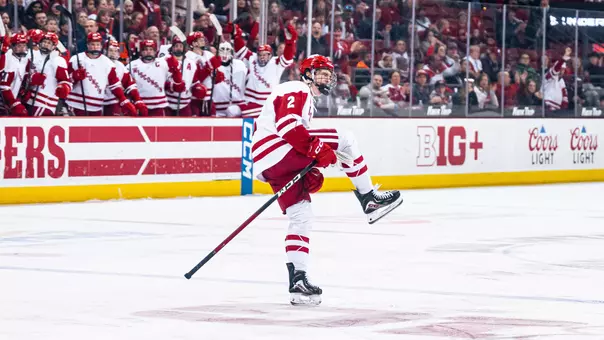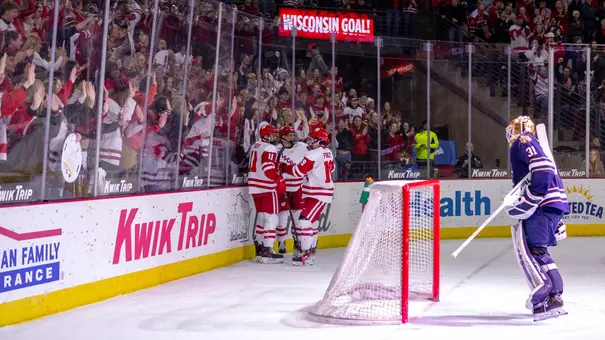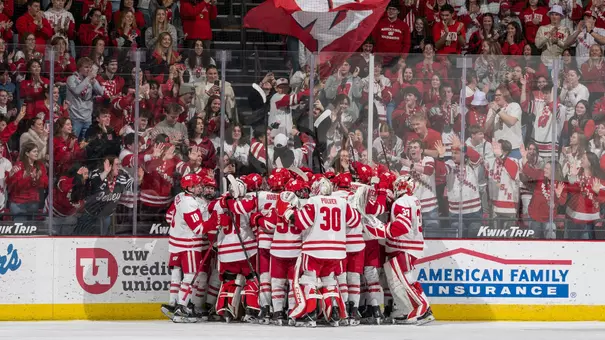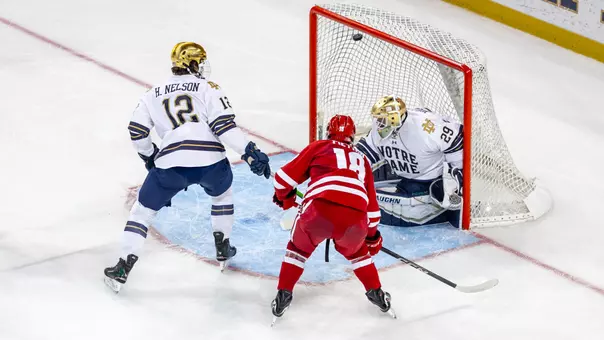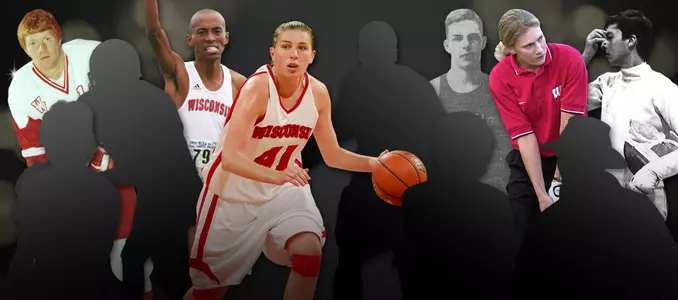
2018 UW Athletic Hall of Fame: Jim Johannson
July 14, 2018 | General News, Men's Hockey, Andy Baggot
Olympian and Badger known globally as USA Hockey leader and friend
 |
||
|
BY ANDY BAGGOT
UWBadgers.com Insider
MADISON, Wis. — In his line of work, Jim Johannson was one of the most powerful figures in the world.
When he walked into a room, important people stopped what they were doing, angled in his direction and smiled as they exchanged a handshake or a hug.
Millionaires, headliners and celebrities called on Johannson regardless of their country, continent or native tongue and they did so for the same fundamental reason.
They liked him as much as they respected him.
Johannson had such an engaging, authentic aura about him that you would never guess he was a titan in the world of international hockey.
"Never in a million years," his close friend Tony Granato said.
Johannson was the tireless, zero-ego front man for USA Hockey for more than a decade, guiding the American brand from afterthought to the cutting edge in his role as assistant executive director for operations.
No agreement was signed, no international tournament was entered, no roster was assembled, no personnel decision was made on behalf of USA Hockey without a blessing from Johannson.

The fact American teams won 64 international medals during his tenure as an executive that began in 2007 — 34 gold, 19 silver and 11 bronze in competition that includes the Winter Olympics and the World Championships — is a testament to how well he went about his business.
But it wasn't until after Johannson died suddenly of heart disease on Jan. 21 — two weeks before the 53-year-old was to oversee the U.S. efforts in the Winter Olympics in South Korea — that the essence of his legacy began to crystalize.
Turns out there was so much more to Johannson, a reality that will be recognized Sept. 7 when he's inducted into the University of Wisconsin Athletic Hall of Fame.
Johannson played for the Badgers from 1982 to '86 — winning an NCAA championship ring in 1983 — and was a two-time Olympian before making his way to the international stage as an administrator.
Along the way, Johannson distinguished himself not so much in stature and power, but by his sense of humanity.
That was evident during a memorial service for Johannson in Colorado Springs, Colorado, where mourners from around the world gathered Jan. 25 to honor they guy they affectionately knew as "JJ."
That was evident during the Winter Games in PyeongChang where an honorary dressing room stall was dedicated to Johannson and where Granato, who played alongside Johannson at Wisconsin and in the Olympics, coached Team USA talent gathered by Johannson.
That was evident during a reunion of the U.S. team that played in the Calgary Games in 1988, a June get-together in Boston hosted by Lane MacDonald that included a series of tearful toasts and tributes to Johannson.
"He was as special a person as anyone could have as a friend, as a leader, as a mentor, as a teammate," Granato said.
Those who knew Johannson will tell you he had a knack for bringing people together, for helping them find common ground, for guiding them to a fair, suitable conclusion.
Johannson's older brother John, who played with Jim for two seasons at Wisconsin, said he learned a lot about his brother's world after his death. In short, Jim was universally trusted and respected whether he was talking to NHL commissioner Gary Bettman, leaders of the International Olympic Committee or International Ice Hockey Federation representatives from Europe.
"He never promoted himself," John said of his only brother. "He would never discuss where he was at and what he did, but the way the other federations and the other countries did was astounding.
"The Czechs, the Russians, the Swedes, the Finns, they all knew Jimmy not just as the face of USA Hockey, but of international hockey. There were numerous times where people said, 'All we'd do on every committee is we'd look to JJ.'
"The Russians said there was not one time where they thought that Jimmy made a decision that was good just for the U.S. He always promoted things that were for the good of hockey.
"He just had a tremendous world-wide respect from everybody."
Jim Johannson networked with Bettman and a consortium of prominent NHL executives to help grow the game in the U.S., an undertaking that put heightened emphasis on the prestigious National Team Developmental Program in Plymouth, Michigan.
Johannson also worked closely with the best American players in the world, from Patrick Kane and T.J. Oshie to Joe Pavelski, David Backes and Ryan McDonagh.
How powerful was Jim Johannson?
"If you asked him, he'd just laugh at that," Granato said.
"But as a country, we've always been second fiddle to Canada. Let's face it, it's Canada's game and everybody looks at hockey as Canada's game.
"Well, guess what? Because of what Jimmy's done the past 20 years, it's now both our games."
The foundation of Johannson's strength was his ability to respect every opinion, every position.
"He could go into a room of people disagreeing and find a way to help them agree," Granato said. "He was the same way as a teammate. He wanted to fit in and make it all work for the better.
"I don't know that I've ever met another human being that could compare to that quality that he had."
Though Johannson endeared himself to most everyone at the highest levels of international hockey, some of his best instincts were saved for the unsung.

Granato told the story of an email that he and Johannson received after the latest U.S. Olympic team roster was finalized. It was written by one of the players who tried, but failed to make the final cut.
"A really nice letter," Granato recalled. "He wanted to know why he didn't make it."
Granato offered to craft a reply, which he admits would have been short, sweet and to the point.
Johannson insisted he would handle it and proceeded to take a deep dive into the player's importance to USA Hockey, what he meant to the organization and thanking him for his service.
Granato read the response and, impressed, asked Johannson why such a busy man would spend so much time on such an extensive project.
"He deserves it because he put hours and hours and hours into trying to make our team," Johannson replied. "I owed him an explanation."
Granato, entering his third season as the Wisconsin men's hockey, learned a valuable lesson in human relations.
"That's why Jimmy's so special," he said.
John Johannson said for all his brother's power and influence, he preferred being behind the scenes with his favorite people.
"His true heroes at USA Hockey were the equipment managers, the athletic trainers, guys like that," John said.
Stan Wong, a veteran athletic trainer of the NFL (Philadelphia Eagles), USFL (Boston Breakers) and NHL (Washington Capitals, Florida Panthers) who has been with USA Hockey since 2002, is one of those guys. He got to know Johannson while working nearly 50 international events — from the Deutschland Cup to the World Championships to the Olympics — rooming at one point with Johannson during the Olympics in 2010.
"I had the utmost respect for Jim and I say that because he gave that respect back," Wong said.
Known as an upbeat, jack-of-all-trades winger with the Badgers, Team USA in the 1988 and '92 Games and the minor leagues, Johannson spent five years as GM for the St. Paul (Minnesota) Vulcans of the U.S. Junior Hockey League. It's where he became adept at everything from skate sharpening to laundry and equipment repair. It's where he realized those vital, but thankless, tasks should never be overlooked.
"You can really tell the true measure of a man when everyone feels comfortable around him and only later do you find out that he's the most important man in the room," Wong said. "Jimmy never let his title walk in front of him."
Johannson grew up in Rochester, Minnesota, and played 148 career games with the Badgers, accounting for 63 goals, 67 assists and 130 points. His brother said the idea of being in the hall of fame would have thrilled Jim.

"He was one of those guys that no matter where he was in the world, he always knew the scores of Wisconsin hockey, football and basketball games," John said. "He loved Madison."
The Johannson brothers share the same level of affection for Wisconsin.
"We were completely honored to be there," John said. "We're fortunate to be two of those guys that would view it as we owe the university something and not the university owes us.
"From our family, we owe that university a hell of a lot more than they owe us, that's for sure."
Three former Badgers — Granato, Jim Johannson and Mike Richter — played for Team USA in the 1988 Olympics. Their 30th anniversary get-together in June was an emotional celebration of Johannson's life.
With Johannson's widow Abby on hand — the couple has a 3-year-old daughter Ellie — the attendees stood up after dinner and, one by one, took turns talking about how much they admired and missed their friend.
The players are not alone in their sense of loss.
"When you saw him, all you were seeing was that kid from Wisconsin who loved sports, loved hockey, loved his friends, loved his family and could talk to you on any level about anything," Wong said.
"Everyone who ever met him felt the same way about him. He made me so proud. My chest puffed out just to be near that guy.
"I lost a piece of my heart when Jimmy died."
Granato said Johannson was the ultimate teammate, person and friend.
"His personality was such that you just want to be part of his team," he said. "It was a special quality that he had. So many people wanted to be his friend and be part of it.
"There's hundreds of Stan Wongs and Tony Granatos out there that will tell you the exact same thing. There's kids all over the place, managers of rinks all over the place, guys that drive the Zambonis all over the place, there's probably hotdog vendors all over the place who know Jimmy for treating them the way he treated all of us.
"That's what life is all about, being a friend to everybody."
UW Athletic Hall of Fame Class of 2018
- Jolene Anderson, women's basketball
- Simon Bairu, men's cross country, men's track and field
- Allie Blomquist, women's golf
- Bill Chandler, men's basketball
- Tim Gillham, men's fencing
- Jim Johannson, men's hockey
- Next member announced July 15

